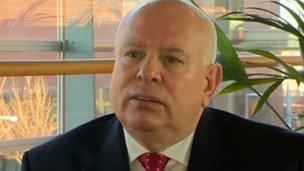Human trafficking: Co-ordinator role 'needs more teeth'
- Published
The charities claim the anti-human trafficking co-ordinator's role needs to be more independent and have more power
Anti-human trafficking charities have warned a job set up to tackle the problem of children being moved around Wales for sexual exploitation needs more power and lacks independence.
Anti-human trafficking co-ordinator Stephen Chapman was appointed by the Welsh government in 2012.
But Safer Wales, one of five charities in the Welsh anti-human trafficking forum, said the role needed more teeth.
Mr Chapman said he was raising awareness of the trafficking issues.
Human trafficking is now the second most prevalent crime worldwide after drugs.
Children and adults are trafficked in and out of the UK for the purposes of sexual exploitation, but victims are also moved within Wales and the other home nations.
Wales was the first UK country to appoint an anti-human trafficking coordinator in 2011 with the aim of raising awareness and helping victims.
But the forum feels the role is too closely aligned to the Welsh government to be truly effective.
Barbara Natasegara, chief executive of Safer Wales, told BBC Wales: "I think the post needs to have teeth. I don't think it's really got those teeth at the moment.
"I think it needs to be much more independent because it can't have a strong voice.
"It's a huge step forward and I'm immensely proud of Wales for it, but we're a long way off actually having the strength and power that person needs."
Tackle the threat
Other forum members are: Welsh Refugee Council, children's charity Barnardo's and counselling charity New Pathways.
Mr Chapman defended the remit of his role on BBC Wales' Good Morning Wales programme saying he was raising awareness of the issue and it was up to politicians if they want to do something else with the role.
When questioned over criticisms by charities that his role was not independent enough and 'lacked teeth' he said: "That's a decision for politicians to make.
"I'm appointed by the Welsh government and it would be up to the politicians if they wanted to do something else with the role. They're holding me to account.
"I can assure you my minister wants to make Wales hostile (to traffickers) and we want to support victims."

Co-ordinator Stephen Chapman said he wants to make Wales 'hostile to traffickers'
Mr Chapman, who took over the co-ordinator's post from Bob Toobey, said he had "galvanised" agencies and organisations in Wales to work better together to tackle the threat of human trafficking and protect and support victims.
Exploitation
These include representatives from agencies such as the police, Home Office, UK Border Agency, Crown Prosecution Service and Gangmasters' Licensing Authority, as well as non-government organisations, the Children's Commissioner and youth justice board.
There were 34 reported cases of human trafficking in Wales last year, but it is thought that the majority of cases go unreported.
One victim, who was born in Wales and trafficked around the country and sexually exploited from the age of 13, said: "At the time I was being moved around to different addresses and areas I really didn't think there was anything wrong with it, and even thought it quite exciting and I felt grown-up.
"But now I know it was all a set-up and that I was being manipulated and tricked. Now that I am out of the situation and looking in, I can see it for what it was, sexual exploitation."
A European Union directive designed to stop trafficking comes into force on Friday, placing a duty on countries to prevent and combat trafficking of human beings.
The Welsh government said it was doing all it could to tackle human trafficking, and the role of the anti-human trafficking co-ordinator was to make Wales as hostile to the crime as possible.
"As the matter is not devolved, creating an independent role would be a matter for the UK government," said a spokesperson.
"Maximising our impact through the existing legislative framework and by co-ordinating action in all sectors is our current priority."
- Published13 January 2013
- Published8 January 2013
- Published12 December 2012
- Published2 December 2012